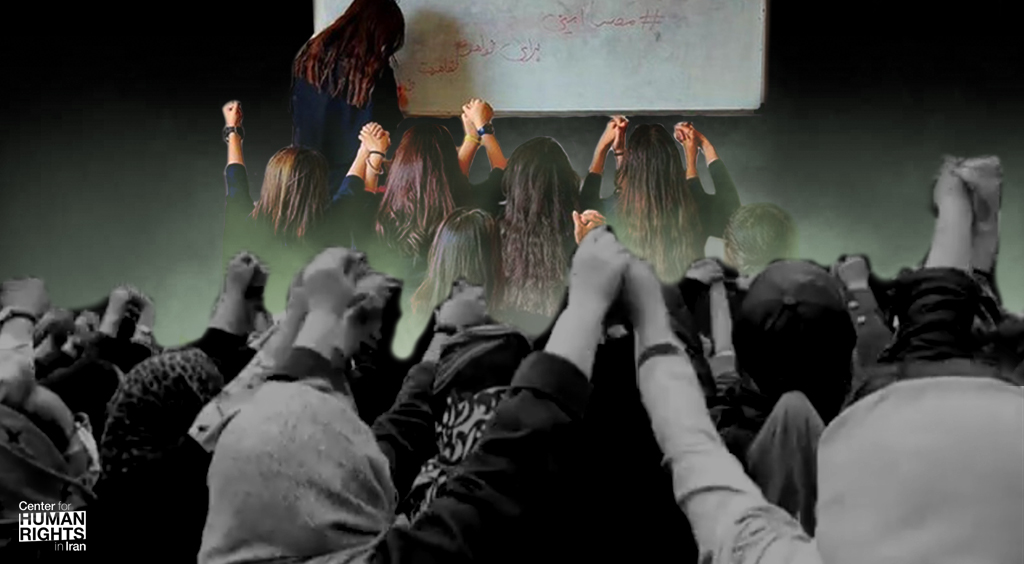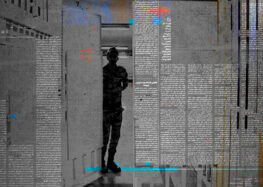Teachers Across Iran Protest Government’s Inaction on School Gas Attacks

Arrests, Tear Gas Against Peaceful Protesters Reported by Eyewitnesses
Government Dithers While Thousands of Schoolgirls Sickened
Amid ongoing poison gas attacks reported at girls’ schools in dozens of cities in Iran, the Coordinating Council of the Iranian Teachers Trade Association (CCITTA) held nationwide protests in Iran on March 7, 2023, demanding protection for children’s access to education.
“The authorities and perpetrators involved in these incidents must know that students are the teachers’ red line,” warned the teachers’ association in its call for protests. A final resolution was read aloud at the protests.
In an interview with the Center for Human Rights in Iran (CHRI), the spokesman of the CCITTA, Mohammad Habibi, a former prisoner of conscience, said the protest was a message to “the government, law enforcement, the judiciary and security agencies” that teachers would never stop demanding security and rights for students.
Protests were held in more than 30 cities across Iran by teachers and parents increasingly frustrated at governmental inaction in the face of gas attacks that have sickened thousands of school girls over the last few months.
Eyewitness accounts provided to CHRI, translated below, described state security forces injuring teachers as well as arresting and tear-gassing peaceful protesters.
Reports of children becoming ill from noxious fumes in classes have been reported inside Iran since November 2022, yet Iran’s government waited until early March before admitting that the attacks were deliberate. The authorities have neither identified the source of the attacks nor stopped them at the time of this writing.
More than a dozen human rights lawyers from inside and outside the country have called on the World Health Organization (WHO), the UN Children’s Fund (UNICEF), and the UN Educational, Scientific and Cultural Organization (UNESCO), as well as the International Committee of the Red Cross (ICRC), a humanitarian aid organization, to investigate the attacks.
On March 8, the deputy spokesperson for UN Secretary General António Guterres said the UN’s Iran team had “offered support to speedily and accurately ascertain the facts of this issue.”
That same day, UNESCO tweeted a call for “thorough investigations and immediate action to protect schools and facilitate the return of affected students.”
“I am deeply concerned about the reported poisoning cases of schoolgirls in Iran over the past three months. It is a violation of their right to a safe education,” said UNESCO Director Audrey Azoulay.
UNICEF had offered support the week before.
“School is a safe haven for children and teenagers to learn in a safe and supportive environment,” tweeted UNICEF. “Such events can have a negative impact on the high rate of education of children, especially girls, which has been achieved in recent decades. UNICEF stands ready to provide any support needed.”
At Least 5,000 School Girls Targeted at 230 Schools So Far
Since the first reported poison gas attack on a girls’ school in Iran in late November 2022, at least 5,000 school girls across the country have reported smelling noxious fumes in class, while countless have been hospitalized with reported symptoms of numbness and nausea, reported the Iranian parliament’s fact-finding mission on March 6.
Due to the Iranian government’s blocking of independent and transparent reporting in the country, CHRI cautions that the actual number could be much higher.
On March 7, the day of the teachers’ and parents’ nationwide protests, hundreds of students were hospitalized after reportedly inhaling noxious fumes at girls’ elementary and high schools in cities including Tehran, Mashhad, Isfahan, Shiraz, Sanandaj, Marivan, Khorramabad, Mahshahr, Abdanan, Nooraband Mamasani, Bushehr, Jolfa, Hamadan, Takestan, Shirvan, Bojnourd, Kashmar, Saqqez, Harsin, Aligoodarz, Ardabil, Rasht, Lahijan, Babol Kermanshah, Dalaho, Karaj, Ahvaz, Izeh and Samirom.
At least two boys’ schools were also targeted.
“The call that was issued for the March 7 protest and the resolution that was read at the gathering addressed the issue of insecurity in schools and the serial poisoning of students, especially girls,” CCITTA Spokesman Habibi told CHRI.
“Since ensuring the security of schools is the responsibility of security and law enforcement agencies, we are mainly addressing the government, law enforcement, the judiciary and security institutions,” added Habibi.
Habibi, a prominent education and teachers’ rights activist, was imprisoned for engaging in peaceful advocacy from April 2022 until February 2023.
“Of course, we have not received any response from these institutions so far, which indicates that either these incidents have been carried out directly by state institutions or supported by them,” he told CHRI.
“We have stated in our call to action that if the insecurity of educational spaces is not addressed, the CCITTA will organize larger-scale protests,” Habibi said.
Eyewitnesses Report Tear Gas, Arrests at Peaceful Protests
At a rally in Sanandaj, the capital of Kurdistan province, two teachers were injured and five others were arrested by state security agents.
There was also a heavy state security presence at protests in Rasht, Shiraz, Mashhad and Karaj, CHRI was informed.
A teacher who participated in the March 7 protests in Sanandaj told CHRI:
There was heavy [state] security. We were supposed to gather at 10 o’clock in front of the education department building, located on a busy street, near one of the city’s important mosques, one or two public high schools, and a relief and rescue center. Since the morning, riot police and security forces were present on both sides of the street.
The protest began with slogans of “Death to the Taliban, in Afghanistan and Iran,” and “School safety is our undeniable right,” but the crowd had not yet warmed up when [the security forces] fired tear gas.
Two of our retired colleagues, Mr. Bahaoddin Maleki and Varya Karimi, were detained. Plainclothes and uniformed officers were among the crowd, insulting teachers. Mr. Kamal Fakourian, Jabbar Pakzad, and Abed Ahmadi later went to the security police to follow up on the status of the detainees, and they were also taken into custody.
Another member of the association, Mr. Mokhtar Asadi, who had not yet reached the gathering, was arrested at his home. Today, except for Mr. Abed Ahmadi, who has been released, the rest were transferred to Sanandaj Central Prison because they defended the right to the safety and health of students.
An eyewitness at the teachers’ and parents’ protest in Rasht, Gilan province, told CHRI:
On March 7, demonstrations were held in Rasht, Lahijan, and some other cities in the province, but government forces attacked the gatherings in the first few minutes and tried to disperse them. Despite coughing heavily, the people shouted ‘Shameful!” and stood their ground and sang [a revolutionary] anthem.
As Mr. Jafar Mirza Bagheri, a member of the Board of Directors of the Teachers Trade Association in Gilan province was reading the final resolution, agents in civilian clothes attacked teachers with insults and violence. They confiscated the sound system and violently arrested several young people. They used so much pepper spray that many people felt sick.
They had closed the [education department’s] main office. A woman who was feeling sick told one of the guards to open the door and said, “I’m dying brother; give me some water.” But the guards replied, “Die, we don’t have any water.”
During the protest in Shiraz, the capital of Fars province, teachers Mohammadali Zahmatkesh and Gholamreza Gholami were arrested and held in detention for several hours before being released.
“The Mahsa Amini [protest] movement’s great achievement has been the issue of freedom of dress and hijab,” Habibi told CHRI. “The government cannot easily ignore the development and is trying to reimpose its authority by making girls in schools, universities, and dormitories unsafe.”
Since nationwide, anti-state protests erupted in Iran in September 2022, several teachers have been arrested and prosecuted.
In early November, three senior members of the Teachers Trade Association in Gilan province—Anoosh Adeli, Mahmoud Sesighipour, and Aziz Ghasemzadeh—were sentenced to a year in prison in connection with their criticism of government policies and for encouraging people to protest.
Meanwhile, Pirooz Nami, secretary general of the Teachers Trade Association in Khuzestan province, who has been sentenced to a year in prison on national security charges, was denied clemency because he refused to write a statement expressing remorse for his peaceful activities.
Then on February 27, 2023, in the southern port city of Bushehr, a senior member of the Teachers Trade Association Mahmoud Melaki was slapped with a lifetime ban on state employment and will be denied his pension, despite many years of service.
This report was made possible by generous donations from readers like you. Please donate today.
Read this article in Persian






